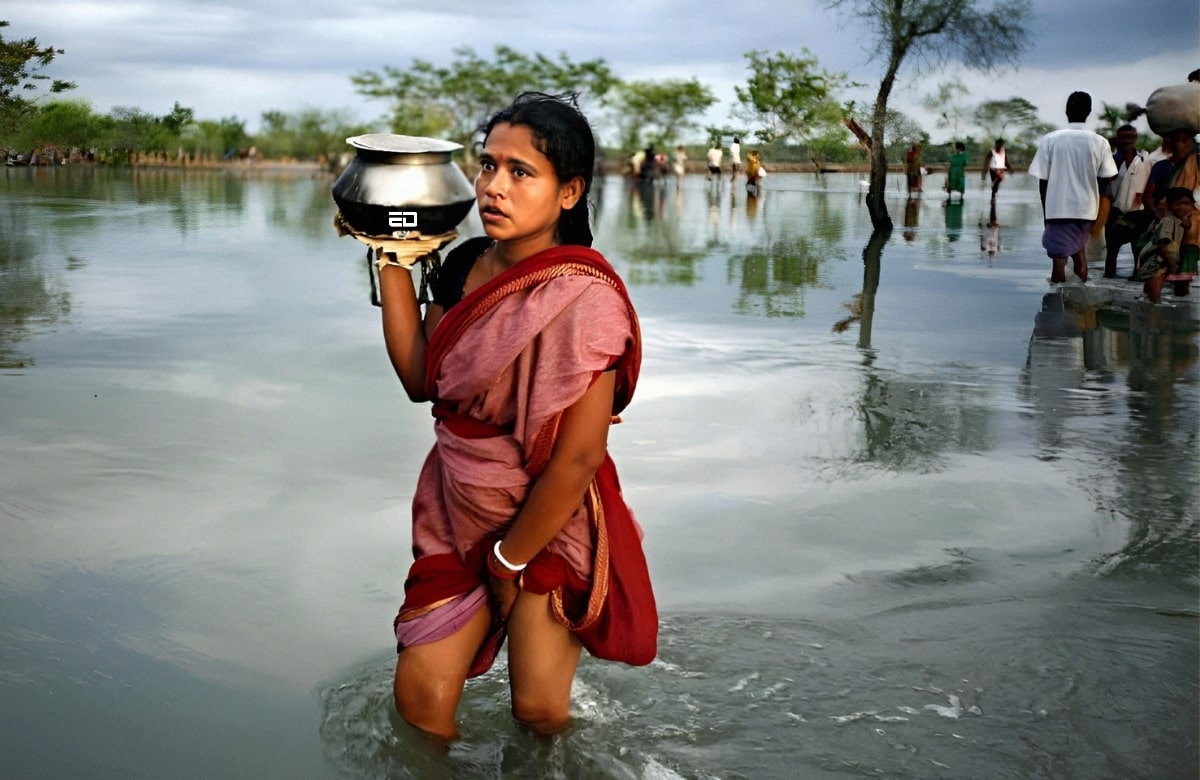Climate change is no longer just a theoretical concept. It is a reality. A harsh reality we all are facing, that too because of our own mistakes. However, some of us are at the forefront of this harsh reality. Women.
Here are all the reasons – the why’s and how’s behind this.
Is Climate Change Gender Biased?
Climate change affects us all. We can all feel the same from the scorching heat we faced in the past months which caused us severe discomfort, led to the death of animals who had no access to water and also caused problems to natural vegetation, such as crop failures.
Undoubtedly every living being on this planet is facing the repercussions of climate change, a product of man-made mistakes. However, a part of society spearheads these consequences.
Climate change affects women more than men. How? According to the UN Environment, women and girls account for 80% of the people displaced by climate change and they face heightened risks of violence and unintended pregnancies as they migrate to safer locations.
The ‘Internal Displacement Monitoring Centre’ states that India had the highest number of people displaced by climate-related disasters in 2019, with over 5 million people affected.
Read More: Study Finds Disturbing Link Between Climate Change And Domestic Violence
How Does Climate Change Disproportionately Affect Women?
Across the globe, women depend more on natural resources and yet have limited access to them. In rural communities, girls bear the responsibility of getting food, water and other household resources. But as climate change causes droughts, floods, and erratic heavy rainfalls, they are bound to travel longer distances.
An example supporting this hard fact is the heavy drought of 2022 in Kenya, where women were hit the hardest by the crisis through female genital mutilation, child marriage and gender-based violence. A UNICEF report revealed that women and girls in India spend 150 million hours collecting water every day, which is equivalent to a workforce of one million people.
Adding on, women account for over 60% of agricultural workers in India and are responsible for up to 90% of the post-harvest work; according to a study by the International Food Policy Research Institute, climate change is projected to reduce agricultural yields in India by 18.6% for wheat and 10.8% for rice by 2050. This further backs up the fact that women are disproportionately affected by climate change.
Climate change also endangers the health of women, predominantly owing to their pre-existing lack of access to health and medicare services.
According to a 2022 UN Women report, extreme heat increases the risk of stillbirth, and the spread of vector-borne diseases like malaria, dengue fever and Zika virus which are associated with adverse maternal and neonatal outcomes.
Consider the example of monsoons flooding the overcrowded slum areas. The lack of infrastructure in such places renders restrooms and toilets unusable. Unlike men, women cannot relieve themselves outdoors making them susceptible to Urinary Tract Infections, especially during menstruation.
What Is Being Done To Solve The Issue?
Women have historically developed knowledge and skills related to natural resource management. For example, in Africa, women often embody wisdom pools with traditional expertise and inherited local knowledge that revolves around understanding early warning signs and the effective mitigation of short and long-term impacts of disasters.
Yet, women continue to be severely under-represented in decision-making processes. A 2019 study by the UN Women found that increasing women’s representation in national parliaments led to the adoption of more stringent climate change policies.
India is a signatory to CEDAW (Convention on the Elimination of All Forms of Discrimination Against Women) and so, commits to formulating gender-sensitive climate policies. Support has to be extended to take up climate actions for the women, by the women, and to the women.
Image Credits: Google Images
Feature image designed by Saudamini Seth
Sources: UN Women, Observer Research Foundation, World Economic Forum
Find the blogger: Unusha Ahmad
This post is tagged under: women, UN, CEDAW, India, policies, climate change, Africa, wisdom pools, reports, infrastructure, UTI, menstruation, men, girls, stillbirth, Zika virus, malaria, dengue fever, diseases, agriculture, slum, rural, UNICEF, violence, Kenya, pregnancy, displacement, internal, environment, rainfall, heat
Disclaimer: We do not hold any right, or copyright over any of the images used, these have been taken from Google. In case of credits or removal, the owner may kindly mail us.
Other Recommendations:
ResearchED: Sexual Violence And Climate Crisis Are Linked To Each Other, This Is How


































